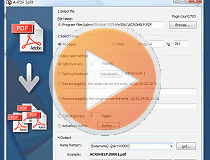
A-PDF Split
A-PDF Split is a very simple, lightning-quick desktop utility program that lets you split any Acrobat pdf file into smaller pdf files. It provides complete flexibility and user control in terms of how files are split and how the split output files are uniquely named. A-PDF Split provides numerous alternatives for how your large files are split - by pages, by bookmarks and by odd/even page. Even you can extract or remove part of a PDF file. A-PDF Split also offers advanced defined splits that can be saved and later imported for use with repetitive file-splitting tasks. A-PDF Split represents the ultimate in file splitting flexibility to suit every need.
A-PDF Split works with password-protected pdf files, and can apply various pdf security features to the split output files. If needed, you can recombine the generated split files with other pdf files using a utility such as A-PDF Merger to form new composite pdf files.
A-PDF Split does NOT require Adobe Acrobat, and produces documents compatible with Adobe Acrobat Reader Version 5 and above.
|
|
|
|
| only $35. Special Offers Get a free license >> |
Free download trial version |
Features and Functions
- Standalone program. Does NOT require Adobe Acrobat or Reader
- Splitting PDF files by every n pages, bookmarks, collating
- Remove pages from PDF files.
- Powerful advanced split option
- Save/Load advanced split option
- Extract pages from PDF files by range.
- Named split output files with name pattern.
- Supports "owner" password protected PDF files
- Supports "user" password protected PDF files (requires inputting password)
- Supports output file security
- Supports output file properties/Information (such as Author, Subject)
- Right-click integration
- Drag and drop supported
- Free download
- Very easy to use
Output file name pattern list
|
Macro |
Description |
|
{basename} |
The unsplit file name without extension name. |
|
{part:0...0} |
A sequential number. You can set the sequence start and interval using the setting. 0...0 is place-holder. For example, you are using {part:0000}, will get 0001, 0002 etc. You can use other place-holder: A..A : the number will be uppercase letter, instead of digit, such as: A, B, C B..B: The number will be lowercase letter. Such as: a,b,c R..R: The number will be uppercase roman letter. Such as: I, II, III M..M: The number will be lowercase roman letter. Such as: i, ii, iii |
|
{filecount:0..0} |
The count of resultant files. The place-holder is same as above. |
|
{pagebegin:0...0} |
The output file begin page number in original file. The place-holder is same as above. |
|
{pageend:0...0} |
The output file end page number in original file. The place-holder is same as above. |
|
{pagecount:0..0} |
The page count in the file. The place-holder is same as above. |
|
{bookmark} |
Current bookmark item. Only available when using spilt by bookmark. |
| {bookmarkN} | Bookmark level N item. N is a level number. For example, {bookmark2} means name of bookmark level 2. If split to bookmark with level 3, the {bookmark} means the current bookmark name (level 3), {bookmark1} means the level 1 name, and {bookmark2} means the level 2 name. |
|
{pagerange} |
Range of page number. Such as 10,24-32. |
| {removerange} | Range of removed page number. Only available when using Remove pages. Such as 10,24-32. |
| {namelist} | A pre-defined name list. Specify a text file which contains all names. In the file, one name per line.
|
| {pagelabel} | Page number(label) in source file. |
 Follow us
Follow us  Newsletter
Newsletter
